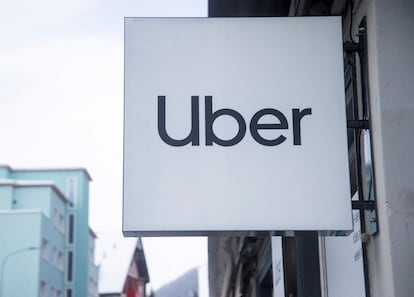Uber unveils $7 billion share buyback plan after first profitable year
The company has promised analysts and investors strong business growth and profitability over the next three years

Uber has reached its dream destination: profitability. On Wednesday, the company — which last week posted its first earnings since it went public — informed the U.S. Securities and Exchange Commission (SEC) that it is launching a $7 billion share buyback program. The company called a meeting with analysts and investors to detail these shareholder payout plans and its forecasts for the future, which point to strong business growth and profitability.
“Today’s authorization of our first-ever share repurchase program is a vote of confidence in the company’s strong financial momentum. We will be thoughtful as it relates to the pace of our buyback, beginning with actions that partially offset stock-based compensation, and working towards a consistent reduction in share count,” said Prashanth Mahendra-Rajah, the company’s CFO.
Uber shares soared in response to the news. Share buybacks are a way to reward shareholders. The company has not provided details on the timing, form, price and amount of the share buyback. The plan comes after Uber recorded its first profitable year since it went public in 2019, closing 2023 with $1.887 billion in profit.
Uber recorded operating profit for three quarters, and now appears to have definitively passed the break-even point as it continues to grow at full steam.
Strong growth
At Wednesday’s conference call with investors, Uber CEO Dara Khosrowshahi and CFO Prashanth Mahendra-Rajah, along with other company executives, announced that the company expects annual gross revenue growth between 15% and 20% over the next three years. The company leaders also forecast adjusted EBITDA growth of 30% to 40% on average per year, and free cash flow as a percentage of adjusted EBITDA at or above 90% per year.
Uber suffered heavy losses during the Covid-19 pandemic. It recorded $8.506 billion in losses in 2019 and $6.768 billion in 2020. In 2021, it was in the black by just $496 million, before registering a record-high loss of $9.141 billion in 2022. Now, it has turned its income statement upside down. What’s more, it has doubled its stock market value in just 12 months, reaching an all-time high. Its market capitalization is approaching $150 billion, and the company was added to the benchmark S&P 500 index.
“I am proud of the incredible progress that we’ve made in the five years since our IPO,” Khosrowshahi said during the investor call. “In Uber’s early days, we were rapidly expanding all around the world while making massive investments to build our category position. Given those enormous losses, many people questioned whether Uber could ever make money. Fast-forward to today, and that question has been asked, and it’s been answered. Uber is stronger than ever, delivering exceptional growth and profitability,” he added.
“The strategy is simple; to build best-in-class products, and then to amplify them with the power of the platform,” the CEO continued. “As we’ve scaled, that power has become even more clear. Now, our platform gives us a simple but significant advantage. We can acquire customers at a lower cost and at the same time generate higher lifetime value than our competitors. It also means we can bring more products to the market more quickly, and more efficiently than any other competitor.”
Uber has widened its lead in profitability, productivity and diversification over its closest global competitor: Lyft. The rival company reported its results on Tuesday, but mistakenly included one zero too many in its forecasts. Lyft shares soared 67% before the situation was clarified. After that, they plummeted.
Sign up for our weekly newsletter to get more English-language news coverage from EL PAÍS USA Edition
Tu suscripción se está usando en otro dispositivo
¿Quieres añadir otro usuario a tu suscripción?
Si continúas leyendo en este dispositivo, no se podrá leer en el otro.
FlechaTu suscripción se está usando en otro dispositivo y solo puedes acceder a EL PAÍS desde un dispositivo a la vez.
Si quieres compartir tu cuenta, cambia tu suscripción a la modalidad Premium, así podrás añadir otro usuario. Cada uno accederá con su propia cuenta de email, lo que os permitirá personalizar vuestra experiencia en EL PAÍS.
¿Tienes una suscripción de empresa? Accede aquí para contratar más cuentas.
En el caso de no saber quién está usando tu cuenta, te recomendamos cambiar tu contraseña aquí.
Si decides continuar compartiendo tu cuenta, este mensaje se mostrará en tu dispositivo y en el de la otra persona que está usando tu cuenta de forma indefinida, afectando a tu experiencia de lectura. Puedes consultar aquí los términos y condiciones de la suscripción digital.









































